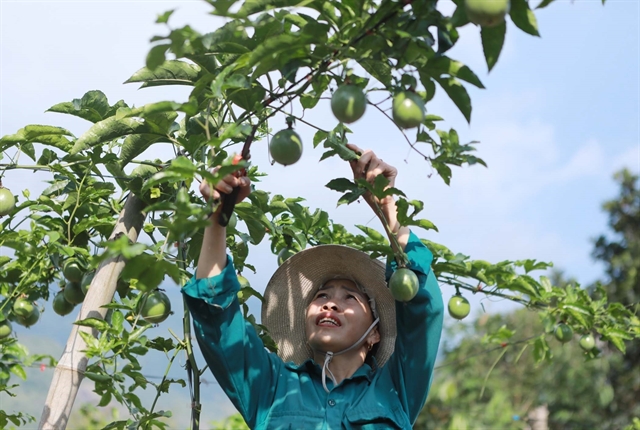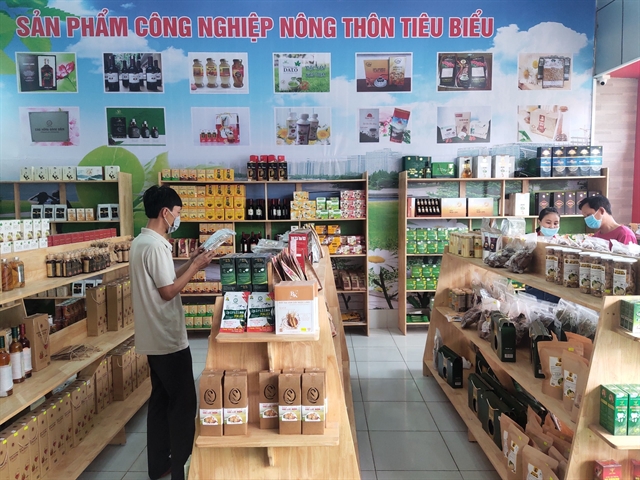 Economy
Economy
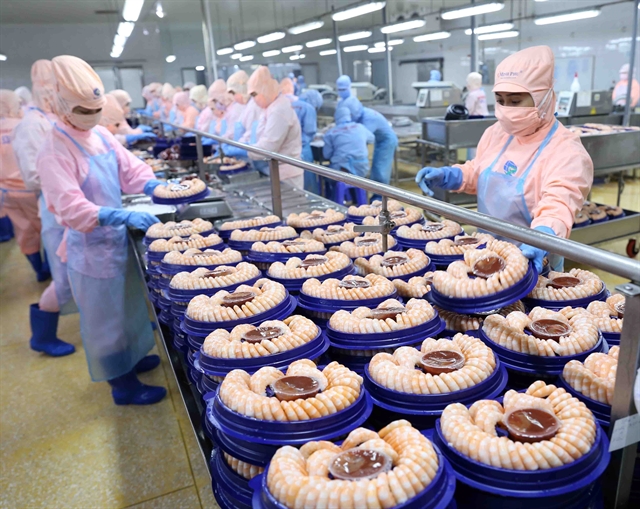
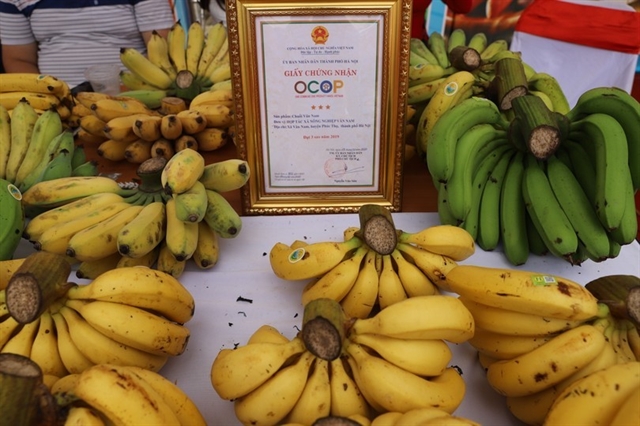 |
| The Vân Nam banana speciality from Phúc Thọ District was recognised as a three-star OCOP product of Hà Nội in 2020. — VNS Photo |
HÀ NỘI — Implementing the "One Commune One Product" (OCOP) program of Hanoi city, in recent years, Phuc Tho district has promoted trade promotion, helping OCOP agricultural products and typical local craft villages in order to have opportunities to access domestic and foreign markets.
The district regularly organises fairs, conferences connecting businesses with e-commerce platforms to promote, introduce and sell OCOP products while identifying effective models in the programme's implementation.
According to the Hà Nội New-Style Rural Development Programme Coordination Office, as of early August 2024, Phúc Thọ District has 67 products evaluated, classified and certified as OCOP.
The district has established eight production linkage chains, with many agricultural products recognised for their trademarks, such as Phúc Thọ grapefruit, pickled eggplant and sticky rice soy sauce.
Some products, like Vân Nam bananas and Tam Hiệp stuffed animals, have developed their own websites.
Vinabisca confectionery has joined the Shopee platform while organic pork, sausage company, Thọ Lộc sausage and Thanh Đa safe vegetables have entered collective kitchens.
Most products have been granted traceability codes and are listed on Hà Nội's hn.check.net.vn website. Notably, the Artistic Mirrors product from Navado Company Limited has been exported to the United States.
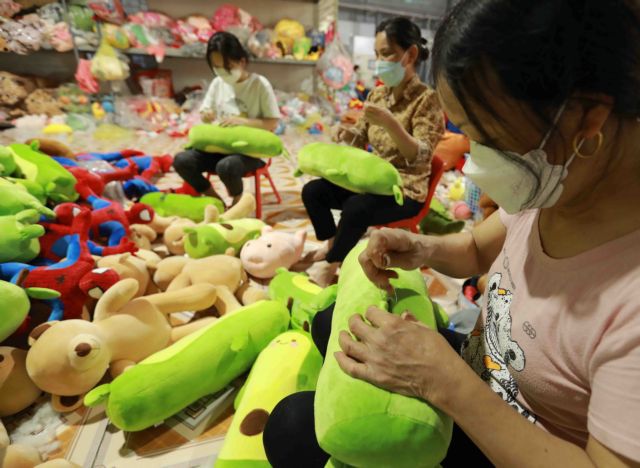 |
| The Hoa Thái stuffed toy manufacturing facility in Tam Hiệp Commune, Phúc Thọ District, supplies thousands of products each month to the domestic market and exports to China. — VNS Photo |
Vũ Thị Huệ, Deputy Head of the Phúc Thọ District Economic Department, noted that since the OCOP programme's implementation, Phúc Thọ's agricultural products have been given more attention in terms of packaging, branding and labelling, with traceability.
Particularly, when selected for the OCOP programme, many producers have boldly applied science and technology to production, creating high-quality, standardised products. To date, many OCOP products from the district have been certified, with clear origins, such as Phúc Thọ grapefruit, Vọng Xuyên scallions, Thọ Lộc organic pork, Thanh Đa safe vegetables and Vân Nam bananas.
Achieving these results is not only due to the role of local authorities but also the efforts of the local people. In Vân Nam Commune, Phúc Thọ District, banana cultivation is a tradition. Doãn Văn Thắng, Director of Vân Nam Agricultural Cooperative, said the entire commune has more than 120 hectares of bananas, cultivated according to VietGAP standards.
In Triệu Xuyên Village, Long Xuyên Commune, Phúc Thọ District, the carpentry trade has been established since the 1990s. The village now has more than 200 production households, providing regular employment for over a thousand workers with an average income of about VNĐ10 million per person per month.
The total production and business value of the carpentry trade reaches nearly VNĐ633 billion (US$25 million) per year, accounting for more than 84 per cent of the village's total production and business value.
In 2023, the business household of Trần Tuấn Anh participated in the OCOP programme and had its L-shaped executive desk and office filing cabinet products evaluated and recognised. Trần Tuấn Anh shared that with branding and OCOP recognition, products sell better, contributing to improving the family's livelihoods.
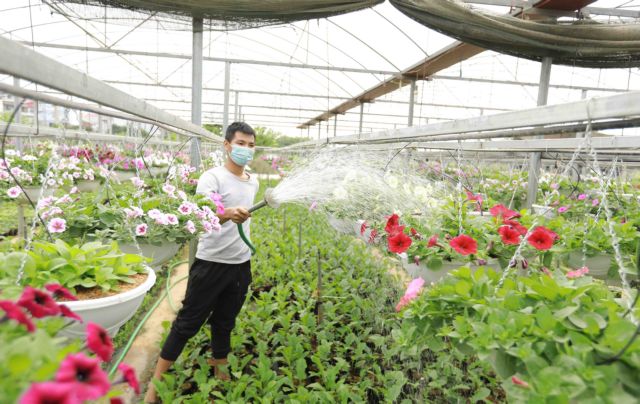 |
| Recently, the flower and ornamental plant village in Tích Giang Commune has converted dozens of hectares of low-yielding rice fields into sites for cultivating flowers and ornamental plants. — VNS Photo |
According to a report from the Phúc Thọ District Economic Department, the district currently has nine craft villages recognised by Hà Nội City. Notable among them are the garment villages of Thượng Hiệp (Tam Hiệp Commune) and Táo Village (Tam Thuấn Commune), the carpentry villages of Phú An Hamlet (Thanh Đa Commune) and Triệu Xuyên Hamlet (Long Xuyên Commune), the flower and ornamental plant village of Tích Giang Commune and the agricultural product processing village of Linh Chiểu (Sen Phương Commune).
For the agriculture sector, Phúc Thọ District continues to orient the production areas of key crops and livestock for each locality. The district maintains fruit tree cultivation, rehabilitates low-quality grapefruit orchards, expands 1.5 hectares of organic safe vegetable production and eight hectares of VietGAP grapefruit, and has reclaimed 6.3 hectares of abandoned land and is restoring the cultivation of Tiến Vua water spinach in the Sen Phương Commune.
To date, the district has 1,330 hectares of fruit trees.
Each crop season has 615 hectares of vegetables, of which 320 hectares are safe vegetables and 556 hectares of flowers and ornamental plants. These diverse craft and agricultural products contribute to Phúc Thọ District's continued development of OCOP products.
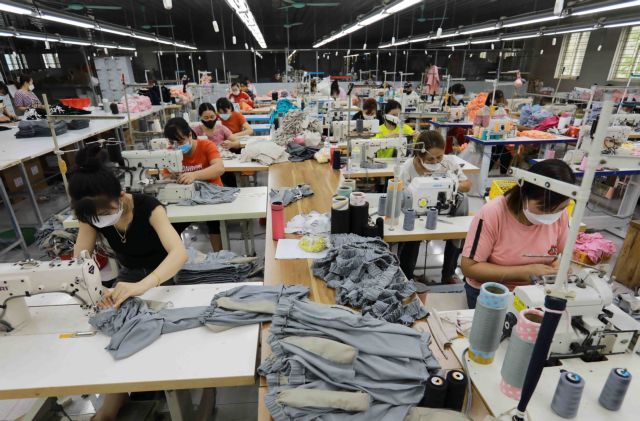 |
| The Tam Hiệp sewing village provides stable employment for over 2,000 workers within the village and thousands more from surrounding communes in Phúc Thọ District. — VNS Photo |
Regarding the implementation of the OCOP programme in the area, Nguyễn Đình Sơn, Chairman of the Phúc Thọ District People's Committee, stated that in 2024, the district aims to have an additional 10 to 12 OCOP products evaluated and classified. The district has developed a production plan, reviewing potential product groups for development and improvement.
Ngọ Văn Ngôn, Deputy Chief of the Hà Nội New-Style Rural Development Programme Coordination Office, assessed that Phúc Thọ District has proactively engaged, focusing on developing OCOP products based on local potential, craft village strengths, and regional specialties. Additionally, OCOP entities have actively participated in the programme.— VNS
This article is published in coordination with the Hà Nội New-Style Rural Development Programme Coordination Office.



